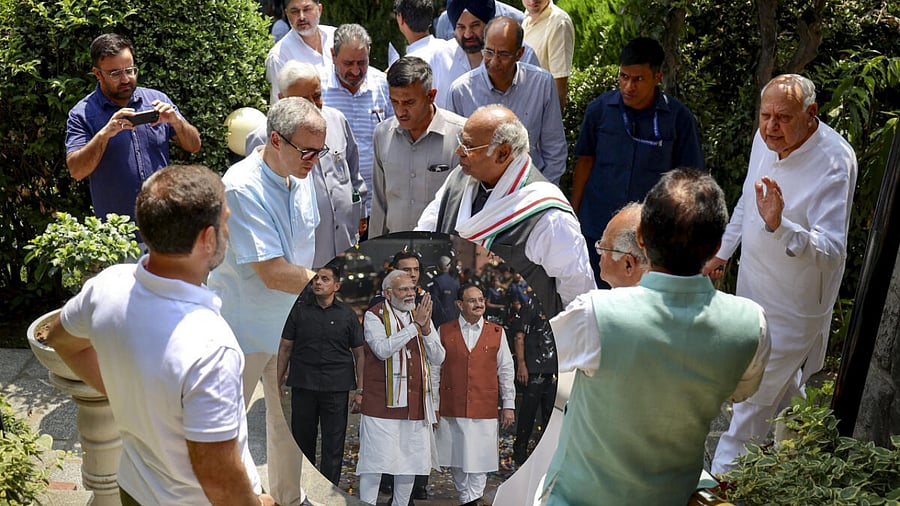
Congress President Mallikarjun Kharge and party leader Rahul Gandhi with J&K National Conference President Farooq Abdullah and Vice President Omar Abdullah. (Inset: PM Narendra Modi and BJP President J P Nadda).
Credit: PTI Photos
The people of Jammu and Kashmir have voted in the National Conference (NC)-Congress-CPI(M) alliance, giving it a clear majority of 49 in the 90-strong Jammu & Kashmir Assembly. With the Bharatiya Janata Party (BJP) a distant second, with just 29 seats, and all in the Jammu region, the stability of the new government should have been a given.
But unlike in his earlier stint as chief minister (2009-2015), the NC’s Omar Abdullah will find his powers severely curtailed this time because of the changed political circumstances. He will take office not just after six years of central rule, a period marked by a clampdown on the media, and five years since the abrogation of Article 370 (that gave the erstwhile state of J&K a special status), and the demeaning shrinking of the state into two union territories.
In almost any other legislative assembly, the numbers would suggest, if not an easy ride for a new government, certainly enough manoeuvring space to get its agenda through. But J&K is today not just a union territory — and therefore subject to the BJP-led Union government — but one where new rules enforced ahead of the current elections granted the Lieutenant Governor (L-G) control over key appointments and services. When the rules came into effect, many local leaders even questioned the value of holding the Assembly elections as long as J&K remained a union territory.
On July 12, the Union home ministry extended the L-G’s administrative authority by amending the Transaction of Business Rules through an executive notification. The L-G now has the final say on the functioning of the All India Services, which includes the senior bureaucracy of the union territory, while placing the Anti-Corruption Bureau, the Directorate of Public Prosecutions, Prisons, and the Jammu and Kashmir Forensic Science Laboratory under his control. The L-G also now has the final approval over the appointment of the Advocate General and other law officers. The government will have to first seek the L-G’s approval for the grant or refusal of prosecution sanction or the filing of an appeal.
Abdullah is well aware of this. In an interview to NDTV, shortly after the results came in on October 8, he outlined the new government’s priorities. Its first objective, he stressed, would be to work to restore statehood — as had been promised even by the BJP — and for this, the new dispensation, he continued, could not afford to have an antagonistic relationship with the Centre. He also made it clear that since restoration of Article 370 would not be possible under the current Union government, that matter should be temporarily shelved. Simultaneously, given that a majority of the seats won by the alliance he will head are from the Kashmir valley, his objective was to give the people of Jammu, too, “a sense of ownership” in the new government. Finally, referring to the subject of security, he underlined the fact that it was still in the L-G’s hands, and would remain so till J&K is granted full statehood.
Even though the BJP, in the run-up to these elections, promised that it would grant statehood to J&K after the elections, party leader Ram Madhav — a key figure in the BJP’s poll strategy both in 2014 and in the just concluded elections — when asked a direct question by NDTV on when statehood would be restored, prevaricated both on the exact date as well as its precise contours. On the timeframe, he said that the union territory would “ultimately” get statehood, adding there were “different formats of statehood”. But this was contingent on the government “not encouraging separatist tendencies”, not seeking abrogation of Article 370 or release of those in jail.
Finally, there is the question of the five nominated MLAs: the Reorganisation Act, 2019, Act allows for five additional members in the J&K Assembly to be selected by the L-G. Abdullah has let it be known that nominating these MLAs without keeping the elected government on board would lead to tensions in the local government's relations with the Centre: “I would suggest them to not do it (nominate from the BJP). Nominating these five won't change the government, so what is the use of it? You would unnecessarily nominate five people to sit in Opposition,” he told ANI on October 9.
Clearly, Abdullah has his work cut out for him once he and his government are sworn into power.
(Smita Gupta is a Delhi-based journalist. X: @g_smita.)
Disclaimer: The views expressed here are the author's own. They do not necessarily reflect the views of DH.